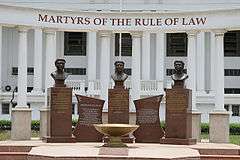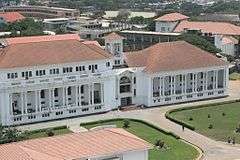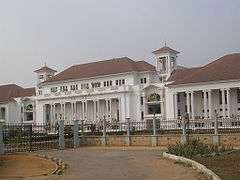Supreme Court of Ghana
 |
| This article is part of a series on the politics and government of Ghana |
| Constitution |
|
Legislative |
|
The Supreme Court of Ghana is the highest judicial body in Ghana.[1] Ghana's 1992 constitution guarantees the independence and separation of the Judiciary from the Legislative and the Executive arms of government.[2]
History
The Supreme Court was established by the Supreme Court Ordinance (1876) as the highest tribunal in the Gold Coast (now Ghana) during the colonial era.[3] Appeals from the Supreme Court went to the West African Court of Appeals (WACA) established in 1866. Ghana withdrew from WACA following independence.[4] After the military coup d'état of February 24, 1966, the National Liberation Council (NLC), by the Courts Decree, 1966 (NLCD.84) abolished the Supreme Court and vested judicial power in two sets of courts: the Superior Court of Judicature and the inferior Courts.[5] This was reversed by Article 102(4) of the 1969 constitution establishing the second republic.[6] After the coup on January 13, 1972, the Supreme Court was again abolished by the National Redemption Council with the reason that the 1969 constitution had been suspended and so there was no need for a court to "interpret and enforce it". Its functions were transferred to the Court of Appeal.[4] This was again reverted by the 1979 constitution when the third republic was established on September 24, 1979.[7] The Supreme Court was left intact after the December 31, 1981 coup by the Provisional National Defence Council, though it made changes to the court system by introducing public tribunals.[7]
On July 2, 2013 the Supreme Court sentenced the editor-in-chief of the Daily Searchlight newspaper, Ken Kuranchie, to 10 days in prison for calling the 9 Justices hypocritical and selective.
Current status



The 1992 constitution stipulates that the Supreme court is made up of the Chief Justice and not less than nine other Justices of the Supreme Court.[8] The Chief Justice is appointed by the President of Ghana acting in consultation with the Council of State and with the approval of the country's Parliament.[9] The other Supreme Court Justices are appointed by the President acting on the advice of the Judicial Council and in consultation with the Council of State. This must also be with the approval of Parliament.[10] The 1992 Constitution abolished all the public tribunals established under the PNDC and created the Regional Tribunal whose chairman was equated with the High Court judge.[7]
Justices of the Supreme Court
The following is a list of the judges of the Supreme Court.[11][12]
- Mrs Georgina Theodora Wood – Chief Justice since June 15, 2007[13]
- William A. Atuguba – (before May 1998)[14]
- Ms. Sophia A. B. Akuffo – (before May 1997)[15]
- Prof. Samuel Kofi Date-Bah – (since 2003)[16]
- Julius Ansah – (since Jul 2004) [17]
- Mrs Sophia Ophilia Adjeibea Adinyira – (since 2006)[18]
- Rose Constance Owusu – (since 11 June 2008)[19]
- Jones Mawulom Dotse – (since June, 2008)[19]
- Anin Yeboah– (since June, 2008)[19]
- Paul Baffoe-Bonnie – (since June, 2008)[19]
- Sule N. Gbadegbe– (since Oct 2009)[20]
- Vida Akoto-Bamfo – (since Oct 2009)[20]
- Anthony A. Benin – (since 11 Nov 2012)[21]
- Joseph Bawa Akamba – (since 11 Nov 2012)[21]
- Former Supreme Court Judges[22]
- K. Adjabeng
- A. K. Ampiah
- Samuel Glenn Baddoo
- Joyce Bamford-Addo
- Charles Hayfron-Benjamin (deceased)
- George Lamptey (Nov. 2000 – 2002)[23]
- Justice Johnson Yaw Kusi Bodum Boateng Siriboe (deceased)
- Samuel Kwadwo Asiamah – (2006–2009)[18]
- Felix Michael Lartey
- Francis Yaonasu Kpegah – (6 January 1993[24] – 2008) – Once the most senior Judge[25]
- Prof. Tawia Modibo Ocran – (2004–2008)
- Richard Twum Aninakwah
- Dr Seth Twum
- Stephen Alan Brobbey
- Theodore Kwami Adzoe (Nov. 2000 – deceased)[23]
- Dixon Kwame Afreh (2002–2004) – deceased
List of Chief Justices of the Supreme Court
Since its inception in 1876, the Supreme Court has had 23 Chief Justices.[26]
| List of Chief Justices of the Gold Coast and Ghana | ||
|---|---|---|
| Chief Justice | Time frame | Period |
| Sir David Patrick Chambers | 1876–1878 | Gold Coast |
| P. A. Smith | 1878–1879 | Gold Coast |
| Sir James Marshall | 1880–1882 | Gold Coast |
| N. Lessingham Bailey | 1882–1886 | Gold Coast |
| H. W Macleod | 1886–1889 | Gold Coast |
| Joseph Turner Hutchinson[27] | 1889 - 1894 | Gold Coast |
| Francis Smith (acting) | 1894 - 1895 | Gold Coast |
| Sir William Brandford Griffith | 1895–1911 | Gold Coast |
| Philip Crampton Smyly | 1911–1928 | Gold Coast |
| Sir George Campbell Deane | 1929–1935 | Gold Coast |
| Sir Philip Bertie Petrides | 1936–1943 | Gold Coast |
| Sir Walter Harrangin | 1943–1947 | Gold Coast |
| Sir Mark Wilson | 1948–1956 | Gold Coast |
| Sir Kobina Arku Korsah | 1956–1963 | Gold Coast (1956 – 6 Mar 1957) Ghana – 1st Republic (6 Mar 1957 – 1963) |
| J. Sarkodee-Addo | 1964–1966 | 1st Republic |
| Edward Akufo-Addo | 1966–1970 | military rule[5] (1966–1969) 2nd Republic (1969–1970) |
| Edmund Alexander Lanquaye Bannerman | 1970 -1972 | 2nd Republic[6] |
| Samuel Azu Crabbe | 1973–1977 | military rule[4] |
| Fred Kwasi Apaloo | 1977–1986 | military rule (1977–1979) 3rd Republic[7] (24 Sep 1979-31 Dec 1981) #[28] military rule[7] (31 Dec 1981–1986) |
| E. N. P. Sowah | 1986–1990 | military rule |
| Philip Edward Archer | 1991–1995 | military rule (1991–1993) 4th Republic (1993–1995) |
| Isaac Kobina Abban | 1995 – April 21, 2001 | 4th Republic |
| Edward Kwame Wiredu | 2001–2003 | 4th Republic |
| George Kingsley Acquah | July 4, 2003 – March 25, 2007 | 4th Republic |
| Georgina Theodora Wood | [13] June 15, 2007 – | 4th Republic |
See also
References
- ↑ "Ghanaian criminal court system". Association of Commonwealth Criminal Lawyers. Retrieved 2011-01-28.
- ↑ 1992 Constitution Article 125(1). "Justice emanates from the people and shall be administered in the name of the Republic by the Judiciary which shall be independent and subject only to this Constitution."
- ↑ "Historical Development of the Courts before Independence – The Supreme Court Ordinance, 1876". Official Website. Judicial Service of Ghana. p. 2. Archived from the original on October 6, 2007. Retrieved 2007-03-26.
- 1 2 3 "History – Summary". Official Website. Judicial Service of Ghana. Archived from the original on 2007-02-13. Retrieved 2007-03-26.
- 1 2 "Historical Development of the Courts after Independence". Official Website. Judicial Service of Ghana. p. 1. Archived from the original on October 6, 2007. Retrieved 2007-03-26.
- 1 2 "Historical Development of the Courts after Independence". Official Website. Judicial Service of Ghana. p. 2. Archived from the original on October 6, 2007. Retrieved 2007-03-26.
- 1 2 3 4 5 "Historical Development of the Courts After Independence". Official Website. Judicial Service of Ghana. p. 3. Archived from the original on October 6, 2007. Retrieved 2007-03-26.
- ↑ "1992 Constitution:Article 128(1)". Ghana Review International.
The Supreme court shall consist of the Chief Justice and not less than nine other Justices of the Supreme Court.
- ↑ Ghana Constitution:Article 144 clause 1 "The Chief Justice shall be appointed by the President acting in consultation with the Council of State and with the approval of Parliament."
- ↑ 1992 Constitution:Article 144 clause 2 "The other Supreme Court Justices shall be appointed by the President acting on the advice of the Judicial Council, in consultation with the Council of State and with the approval of Parliament."
- ↑ "List of Judges of the Superior Court of Judicature". Official Website. Judicial Service of Ghana. Retrieved 2013-01-10.
- ↑ "The Judiciary – Justice of the Supreme Court". Ghana local government website. Min. of Local Govt., Rural Dev. & Environment & Maks Publications & Media Services. Retrieved 2007-04-19.
- 1 2 "Kpegah urges new Chief Justice to unite judges". General News of Friday, 15 June 2007. Ghana Home Page. Retrieved 2007-06-16.
- ↑ . Ghana Home Page http://www.ghanaweb.com/GhanaHomePage/NewsArchive/artikel.php?ID=3912. Missing or empty
|title=(help) - ↑ . Ghana Home Page http://www.ghanaweb.com/GhanaHomePage/NewsArchive/artikel.php?ID=799. Missing or empty
|title=(help) - ↑ "Ghana Now Has 13 Supreme Court Judges".
- ↑ "3 Judges nominated to Supreme Court". Ghana Home Page.
- 1 2 "Two new Supreme Court Judges sworn in". Official website. Judicial Service of Ghana. Archived from the original on 2007-07-01. Retrieved 2007-06-01.
- 1 2 3 4 "Four new Supreme Court Judges Sworn In". General News of Wednesday, 11 June 2008. Ghana Home Page. Retrieved 2008-06-12.
- 1 2 "New Justices Get Approval". Retrieved 2013-01-10.
- 1 2 "Two Supreme Court Judges sworn in". Daily Graphic.
- ↑ "Supreme Court of Ghana – Members of Supreme Court (2005)". Ghana Home Page. 2005. Retrieved 2007-03-26.
- 1 2 "Rawlings swears in two Supreme Court judges". General News of Wednesday, 29 November 2000. Ghana Home Page. Retrieved 2007-07-31.
- ↑ graphicghana.info
- ↑ "Death of the Chief Justice of Ghana". Official Website. Judicial Service of Ghana. Retrieved 2007-04-13.
- ↑ "List of Chief Justices". Official Website. Judicial Service of Ghana. Archived from the original on 2008-06-22. Retrieved 2016-09-01.
- ↑ Peile, John (2014). Biographical Register of Christ's College, 1505–1905. 2. 1666–1905. Cambridge University Press. p. 611. ISBN 978-1-107-42606-1.
- ↑ The Supreme Court was left intact under this military regime. See note 5.
External links
- Official Website of the Judicial Service of Ghana
- Ghana Constitution